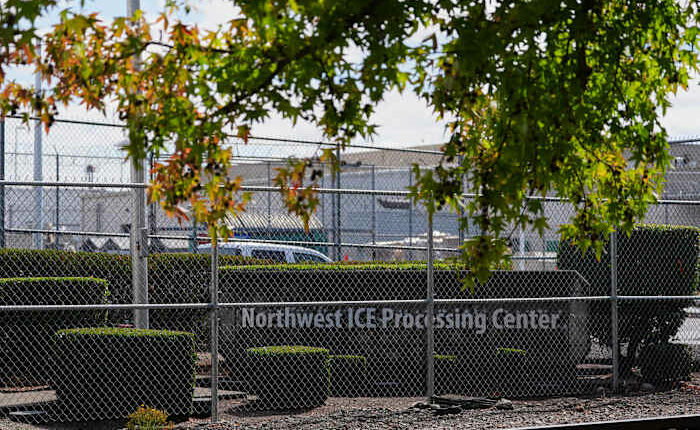Share this @internewscast.com

SEATTLE – Ramón Rodriguez Vazquez dedicated 16 years to farm work in southeast Washington state, where, alongside his wife of 40 years, they raised four children and enjoyed the company of 10 grandchildren. At 62, he was a central figure in his tight-knit community, with no criminal record.
On Feb. 5, immigration officers came to his home in search of another individual but ended up detaining him. Despite strong support from friends, family, his employer, and a physician emphasizing his family’s need for him, he was denied bond.
He was transferred to a U.S. Immigration and Customs Enforcement detention facility in Tacoma, Washington. There, his health worsened rapidly, partly because he did not consistently receive his prescribed medications for multiple conditions, including high blood pressure. Additionally, he was emotionally strained, unable to care for his family or ailing granddaughter, which led him to a state of despair.
During an immigration court appearance, he requested to leave without a formal deportation on his record. The judge agreed, and he returned to Mexico, alone.
His situation highlights the repercussions of the Trump administration’s stringent deportation tactics, prioritizing rapid action over established procedures and legal processes.
Such scenarios are increasingly common in immigration courts nationwide, with ICE opposing bond for all detainees, regardless of their specific situations, since early July.
“He was the head of the house, everything — the one who took care of everything,” said Gloria Guizar, 58, Rodriguez’s wife. “Being separated from the family has been so hard. Even though our kids are grown, and we’ve got grandkids, everybody misses him.”
Leaving the country was unthinkable before he was held in a jail cell. The deportation process broke him.
‘Self deport or we will deport you’
It is impossible to know how many people left the U.S. voluntarily since President Donald Trump took office in January because many leave without telling authorities. But Trump and his allies are counting on “self-deportation,” the idea that life can be made unbearable enough to make people leave voluntarily.
The Justice Department’s Executive Office for Immigration Review, which oversees immigration courts, said judges granted “voluntary departure” in 15,241 cases in the 12-month period that ended Sept. 30, allowing them to leave without a formal deportation mark on their record or bar to re-entry. That compares with 8,663 voluntary departures for the previous fiscal year.
ICE said it carried out 319,980 deportations from Oct. 1, 2024 to Sept. 20. Customs and Border Protection declined to disclose its number and directed the question to the Department of Homeland Security.
Secretary Kristi Noem said in August that 1.6 million people have left the country voluntarily or involuntarily since Trump took office. The department cited a study by the Center for Immigration Studies, a group that advocates for immigration restrictions.
Michelle Mittelstadt, spokesperson for the Migration Policy Institute, a nonpartisan think tank, said 1.6 million is an over-inflated number that misuses the Census Bureau data.
The administration is offering $1,000 to people who leave voluntarily using the CBP Home app. For those who don’t, there is a looming threat of being sent to a third country like Eswatini, Rwanda, South Sudan or Uganda,.
Department of Homeland Security Assistant Secretary Tricia McLaughlin said the voluntary departures show that the administration’s strategy is working, and is keeping the country safe.
“Ramped-up immigration enforcement targeting the worst of the worst is removing more and more criminal illegal aliens off our streets every day and is sending a clear message to anyone else in this country illegally: Self-deport or we will arrest and deport you,” she said in a statement sent to The Associated Press.
“They treat her like a criminal”
A Colombian woman dropped her asylum claim at a June appearance in a Seattle immigration court, even though she was not in custody.
“Your lawyer says you no longer wish to proceed with your asylum application,” the judge said. “Has anyone offered you money to do this?” he asked. “No, sir,” she replied. Her request was granted.
Her U.S. citizen girlfriend of two years, Arleene Adrono, said she planned to leave the country as well.
“They treat her like a criminal. She’s not a criminal,” Adrono said. “I don’t want to live in a country that does this to people.”
At an immigration court inside the Tacoma detention center, where posters encourage migrants to leave voluntarily or be forcibly deported, a Venezuelan man told Judge Theresa Scala in August that he wanted to leave. The judge granted voluntary departure.
The judge asked another man if he wanted more time to find a lawyer and if he was afraid to return to Mexico. “I want to leave the country,” the man responded.
“The court finds you’ve given up all forms of relief,” Scala said. “You must comply with the government efforts to remove you.”
“His absence has been deeply felt”
Ramón Rodriguez crossed the U.S. border in 2009. His eight siblings who are U.S. citizens lived in California, but he settled Washington state. Grandview, population 11,000, is an agricultural town that grows apples, cherries, wine grapes, asparagus and other fruit and vegetables.
Rodriguez began working for AG Management in 2014. His tax records show he made $13,406 that first year and by 2024, earned $46,599 and paid $4,447 in taxes.
“During his time with us, he has been an essential part of our team, demonstrating dedication, reliability, and a strong work ethic,” his boss wrote in a letter urging a judge to release him from custody. “His skills in harvesting, planting, irrigation, and equipment operation have contributed significantly to our operations, and his absence has been deeply felt.”
His granddaughter suffers from a heart problem, has undergone two surgeries and needs a third. Her mother doesn’t drive so Rodriguez transported the girl to Spokane for care. The child’s pediatrician wrote a letter to the immigration judge encouraging his release, saying without his help, the girl might not get the medical care she needs.
The judge denied his bond request in March. Rodriguez appealed and became the lead plaintiff in a federal lawsuit that sought to allow detained immigrants to request and receive bond.
On September 30, a federal judge ruled that denying bond hearings for migrants is unlawful. But Rodriguez won’t benefit from the ruling. He’s gone now and is unlikely to come back.
__
Associated Press reporter Cedar Attanasio contributed to this story.
Copyright 2025 The Associated Press. All rights reserved. This material may not be published, broadcast, rewritten or redistributed without permission.














